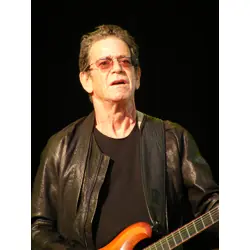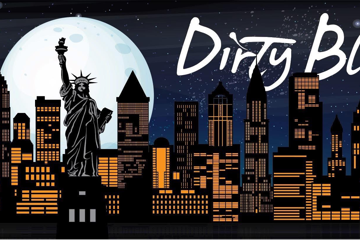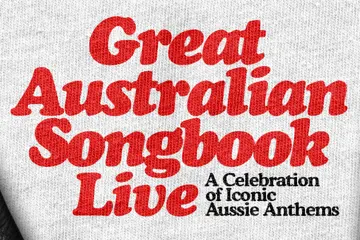 Lou Reed
Lou ReedIn May 2010 Street Press Australia – publishers of theMusic.com.au – spoke with Lou Reed over the phone for an interview promoting his curation of the Sydney Opera House's Vivid festival. A brief conversation which gave the impression that Reed wasn't overly keen to take part, it epitomises the famously 'grumpy' attitude he had.
Reed died at the age of 71 yesterday.
Written by Tom Hawking, here is our last chat with the iconic innovator:
This interview first appeared in the 25 May 2010 edition of The Drum Media.
We have just asked Reed whether he's been enjoying doing a radio show. He's clearly not impressed. “I mean, what would you do if I said, 'No'?”
Okay, we'll be honest – he's right. It was a taking up space question. But then, this interview has been punctuated by many, many awkward spaces that could frankly have done with some taking up. Reed's distaste for doing press interviews verges on the legendary – and this one is clearly no exception. It's taken ages to get him on the phone and now that he's finally on the other end of the line, you can just about feel the receiver frosting up.
We're ostensibly discussing his co-curation with his wife Laurie Anderson of the Vivid Festival. They've put together a fascinating program and there's much interesting stuff to talk about. Unfortunately, Reed shows little inclination to discuss anything much. By all accounts, he's always hated interviews – perhaps with justification, since he's been subjected to some arse-clenchingly stupid questions over the years – and his distaste manifests itself in largely monosyllabic answers and a disinclination to expand on anything. This, unfortunately, creates a kinda self-fulfilling problem, forcing the whole interviewing process into being an uncomfortable interrogation rather than a conversation: next question! Next question! But anyway, so it goes. We're here to talk about Vivid and so we will.
We begin by thanking Reed for taking time out of his obviously hectic schedule to talk to us at all. We're met with stony silence for our trouble. Moving swiftly on then: Reed has been playing of late with what he's dubbed the Metal Machine Trio, which he's bringing to Australia as part of Vivid. The Trio – featuring German composer Ulrich Krieger and electronic musician Sarth Calhoun along with Reed himself – take the 1975 album of the same name as a jumping-off point for their music. So how does this work? Is the live show entirely improvised? “It's all improvised.” Silence. “It's just something that we like to do that developed.” More silence.
Don't miss a beat with our FREE daily newsletter
He's also recently remastered Metal Machine Music, returning to the album 35 years after its release. Why did he return to it now? And did using a modern digital studio offer any new possibilities for the mixes? This, at least, he's (comparatively) keen to talk about. “I got involved in that,” he drawls, “because of a letter from some people who are very much into quad [quadrophonic sound – the four-channel proto-surround sound in which the album was first recorded]. Of course, you can't do quad now, but we figured out a way of doing it by using a home theatre system and taking out the middle. So that was one way of doing it, using a DVD. As far as vinyl goes, we couldn't so we did an approximation of quad in stereo vinyl.”
Might they work together in the studio, then? Or do they prefer working exclusively as a live entity? “I do like working live,” he says. “However, I did just finish a photo curation. The music for that was done by the duo in my home studio.”
Is this the same exhibition that will be coming to Vivid? “Hopefully.” Would it be New York Genius, the exhibition of photos that Reed's chosen from the Magnum archive? “That's a different one.” Oh. So what's the exhibition we're talking about, then? More silence, then: “Yes.”
Right. Let's talk about New York Genius, then. How did Reed tackle such a gargantuan archive of work? “I was up at Magnum in New York, and they had an electronic billboard made available to them for two weeks; one of those huge ones up on a skyscraper and they said, 'Why don't you put something together?' So we decided to put together Magnum photos of New York artists. And that's that.”
Apart from a performance with the Trio, there are several other pieces of Reed's own creative output featuring at Vivid. Particularly interesting sounds a short film titled Red Shirley, which he directed. “It is really interesting. It's screened in a number of film festivals and it's about my 101-year-old cousin Shirley. I directed it myself. The photographer's a really great photographer called Robert Gibson.”
There's also Music For Dogs, on which Reed has collaborated with Anderson. The premise is the music can only be heard by dogs, whose hearing range is outside that of humans. So how do you go about making music you can't hear? “Well, that's really a Laurie question.” We ask whether the project wasn't something he was closely involved with. “I'm not saying that. I'm saying that it's really a Laurie question. She has that far clearer in her mind. I think that's a Laurie question and not a Lou question.”
Okay, well, another Lou question – how did he find the local Australian bands, like The Night Terrors and Zond, he's putting on for Noise Night at the Opera Theatre on Monday? “Well, we [specifically, Reed and veteran producer Hal Willner] do a radio show called the New York Shuffle and we're always listening for new bands, new this, new that and that's where we heard them. The show is people that we like.”
It was at this point that we made the clearly ill-fated decision to ask Reed whether he's enjoying doing radio. By now he's clearly keen to get off the line as quickly as possible. But one more question – what is he planning for his collaboration with The Blind Boys Of Alabama? “We're hoping that different people sing with them. I've sung with them three times – once at the United Nations – [and] they're also going to be at the Lincoln Center in a few weeks. I thought that it would be great to try to find indigenous Australian or New Zealand groups somewhat like them, gospel-oriented, native, to join them. But we'll see how we do.”
Silence. Thank you for your time, Mr. Reed. We hope the festival goes well.
“Thank you. Bye.” ..... Silence.
Tom Hawking
















